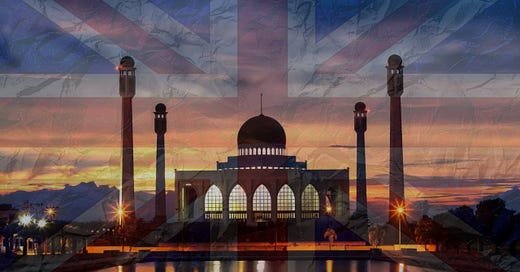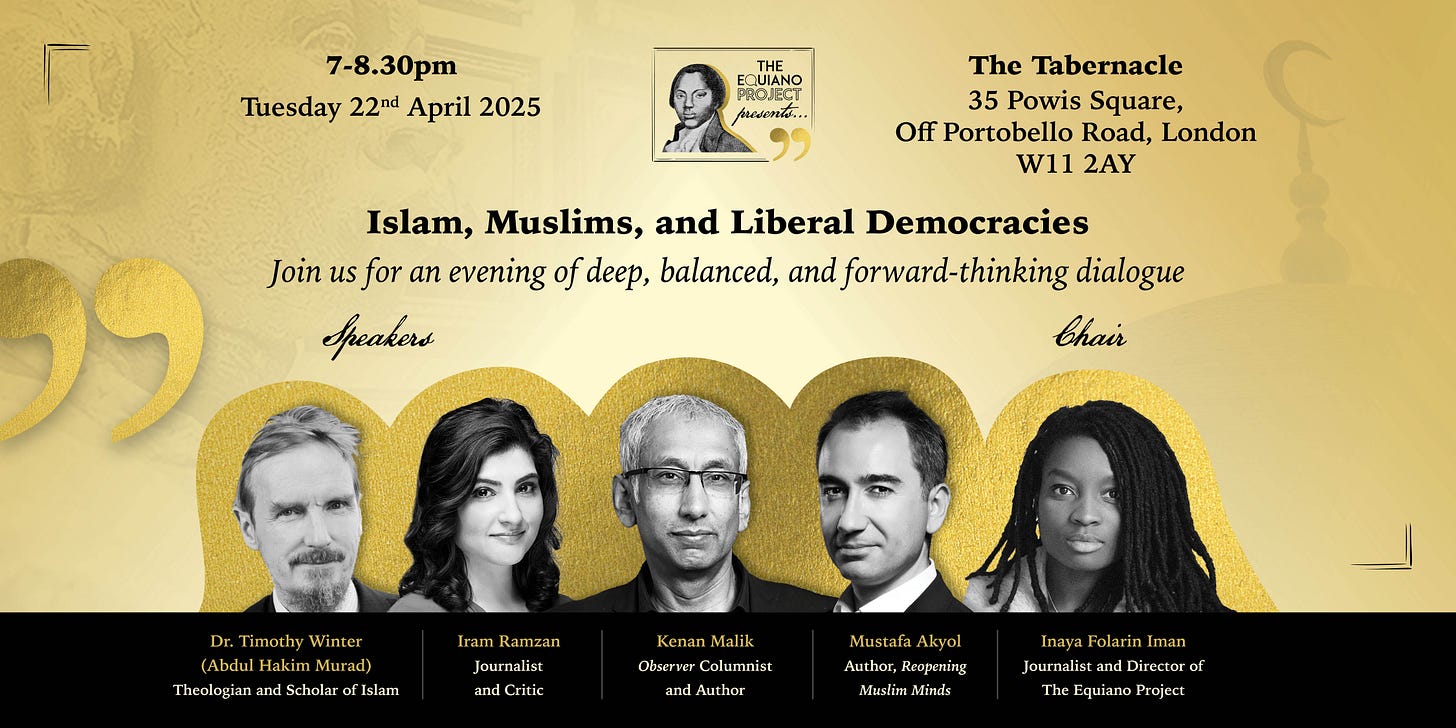My Thoughts on Islam and the West - Ada Akpala
A candid reflection on Islam, identity, and the West
I’ve been thinking a lot about Islam and the West in the lead-up to an upcoming event I’ve been helping to organise.
I won’t pretend to know exactly what the panellists will say on the night, but I wanted to share my views and my own reflections on some of the questions I hope we can explore more openly—during the event and beyond it.
While conversations about identity, race, and culture are still prevalent in public life, Islam often remains the one topic people are hesitant to approach. Too often, the response is fear, defensiveness, or silence. Why is this subject so difficult to talk about? And what are the consequences when we can’t speak openly about one of the world’s largest religious communities?
Islam is now an undeniable and permanent part of the Western world. In the UK for example, Muslims make up nearly 7% of the population. In France, it's closer to 9%. In some cities, these percentages are even higher.
Some argue that Islam and Western values are fundamentally incompatible. Others believe that Muslims are, in fact, integrating, and can continue to do so without issue. The real problem is how Western societies engage with Muslims: too often through suspicion, discrimination, and misunderstanding.
But what will the future of Islam look like here? Can Islam thrive in the West without compromising its core beliefs? Will Islam change the West, or will the West change Islam?
No topic should be off-limits. When we avoid or are unable to have honest conversations, we create an environment where the loudest and most extreme voices take over and cloud the conversation. In this case, whether it’s Islamists or the extreme right, both benefit from the silence of the mainstream.
So, what are the key areas where we need to have more open conversations about Islam? I’ll touch on three:
1) Issues with free speech
Despite living in societies that claim to champion free speech (even though this is increasingly debatable given the ongoing challenges and restrictions placed upon it), the Western world, at least in principle, upholds the value of open expression. Yet Islam often seems to be an exception to this rule, treated as untouchable. Many hesitate to critique or even discuss it openly for fear of backlash or violent retaliation.
Criticism is often met with accusations of Islamophobia. Yes anti-Muslim bigotry exists, but too often, the label of Islamophobia is weaponised to shut down legitimate criticism of Islamic doctrines, practices, or cultural norms.
Islam should not be treated as a “protected faith.” Other religions face scrutiny without generating the same level of controversy. Intellectuals, journalists, commentators, or anyone else for that matter, can critique or even mock Christianity, Judaism, and Hinduism without fear. The same cannot always be said about Islam.
2) The Rise of Islamism in the West
While Islam as a personal faith is one thing, Islamism (the political ideology that seeks to impose Islamic law and principles on society) can be a direct challenge to liberal democracy. Yet even with its growing influence, many Western governments, media institutions, and political activists have been hesitant to to confront it. This silence has allowed Islamist movements to flourish, embedding themselves within political institutions, educational systems, and legal frameworks under the guise of multiculturalism, religious tolerance and diversity.
One of the reasons for this hesitancy may be the West’s historical guilt over colonialism and imperialism, which has sometimes led to an overcorrection on many social issues. Criticism of non-Western cultures, including Islamism, is often dismissed as racist or imperialist, and this makes open discussion difficult. Even when Islamist practices blatantly conflict with democratic values, they are often downplayed or excused.
The failure to address Islamism does not just empower extremists, it also does fuel the rise of the extreme right. If political leaders are truly concerned about the “threat of far-right extremism,” then they should also confront the growing influence of Islamism in our societies. The more mainstream institutions refuse to engage with this issue, the more they create or enable an environment of grievance and mistrust. And the more they hand the narrative over to those who seek to exploit it for their own anti-Muslim agendas that scapegoat all Muslims.
3) Islamophobia
Islamophobia has almost become a political weapon, engineered to blur the line between genuine hatred of people and criticism of a belief system.
It’s also telling how selectively the term gets applied. For example, critiques of Islamic conservatism or discussions about the rights of ex-Muslims are sometimes immediately labelled as Islamophobic. Yet when Muslim women speak out about issues like forced hijab, or when liberal Muslims call for reform within their communities, many of the same voices who are quick to condemn perceived Islamophobia remain silent.
This isn’t about denying that anti-Muslim hatred exists. Of course it does, just like prejudice against every group exists. But using the fear of bigotry to protect ideas from criticism isn’t anti-racist. It’s anti-thinking. And it plays directly into the hands of both Islamists and the far right.
The strength of any society lies in its ability to confront difficult questions. When conversations are suppressed, problems don’t disappear, they grow in the shadows until they become impossible to ignore. Islam can thrive in the West, but it must be open to self-examination and change. No faith or ideology can remain entirely static in a world that is in constant motion.
But there also has to be some responsibility placed on the Western world. Yes, Western societies pride themselves on their capacity for self-examination, reform, and adaptation, but there comes a time when constant introspection must give way to clear definition. A culture that is forever questioning itself, hesitant to articulate its own values for fear of giving offence, risks losing the very identity that makes such self-examination possible in the first place.
Now is the time for the West to define its values clearly and stand by them without hesitation—and, more importantly, without apology. Inclusivity should not come at the cost of diluting foundational principles and a society that is unwilling to defend its own principles will struggle to integrate those who do not yet share them. And will only have themselves to blame.
I spoke with Inaya Folarin Iman about Islamophobia recently on YouTube. We explored how this term shapes conversations around free speech, identity politics, and public life in the UK — and whether it’s helping or hindering the fight against genuine bigotry. Watch it here.
Don’t forget to get your tickets for our upcoming event, Islam, Muslims and Liberal Democracies, hosted by The Equiano Project on April 22nd. It’s a rare opportunity to have the kind of open, honest conversation that too often gets shut down elsewhere.
Click here to grab your tickets, or follow the link below.
(Paid subscribers are eligible for a discount—click here to redeem yours!)






First of all thank you for sharing your thoughts. I think that we have arrived in a time where a lot of extreme voices are the loudest ones. I can share your thoughts, cause that is what I see daily at TVs, social media,reading the news and so on. When I'm discussing such facts with friends, families and others I often see, that we share your thoughts, but often we are torn between the far right ad the left. The voices in between got so silently, and thats a huge problem.
The other thing what really annoys me is that often the voices in between are afraid to say something, for fear of being assigned to a political side.
To critize the Islam in factual manner is either left or right, it is necessary matter for the West
So thank you again, blessings
Carina
I have Muslim friends who hate what is going on, they have worked hard and deserve their success and they see this "islamaphobia" as divisive and do not want it.
I also have Indian friends who are NOT muslim and they don't like the rape gang scandal being associated with "asians" because it tars them with the same brush.
Sadly it is hard for them to stand up and state these facts.